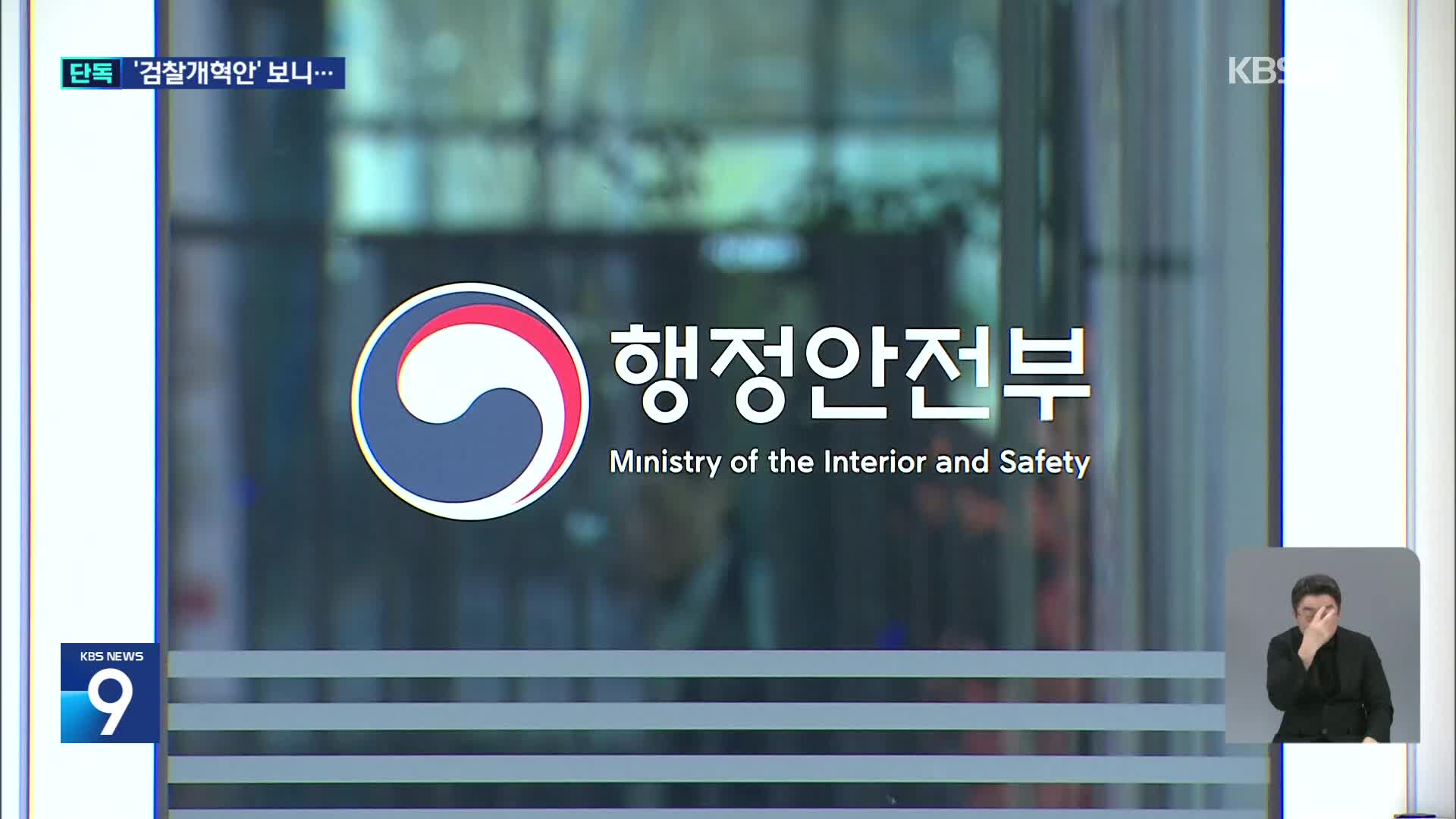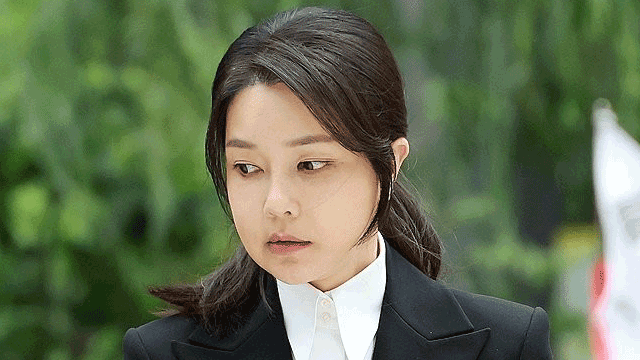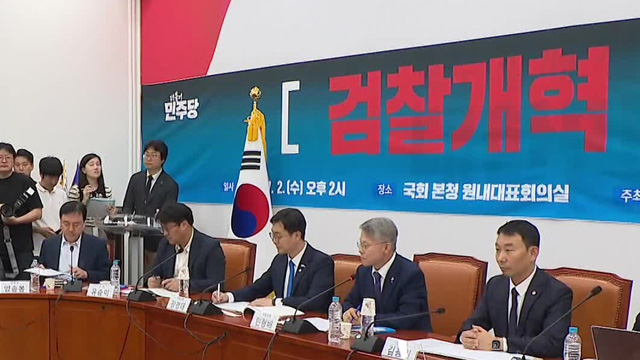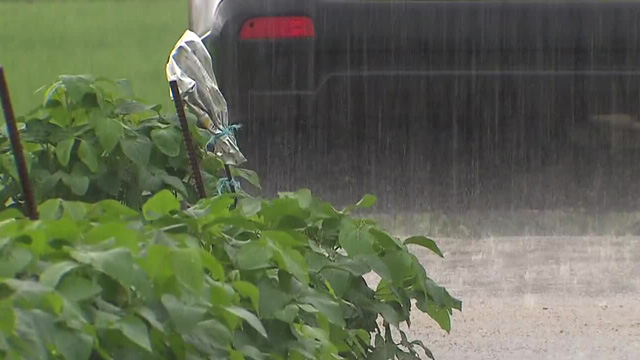[Exclusive]Prosecutorial reform plan
입력 2025.08.06 (02:34)
읽어주기 기능은 크롬기반의
브라우저에서만 사용하실 수 있습니다.
[Anchor]
KBS has exclusively obtained the prosecutorial reform plan recently finalized by the Democratic Party's Prosecutorial Reform Task Force (TF).
Under the plan, a new Serious Crimes Investigation Agency will be established under the Ministry of the Interior and Safety—not the Ministry of Justice.
The existing Prosecutors’ Office will be abolished, and a new Public Prosecution Office will be created. Prosecutors in the new office will not be allowed to request supplementary investigations.
Reporter Choi Yoo-kyung has the exclusive.
[Report]
For over a month, the Democratic Party's prosecutorial reform TF has been holding closed-door discussions on abolishing the current Prosecutors’ Office and completely separating investigation and prosecution.
[Kim Yong-min/Democratic Party Lawmaker/Aug. 1: "We will return investigative powers to the original investigative agencies and have the prosecution focus solely on indictments and maintaining prosecutions."]
KBS has exclusively obtained the final draft of the plan.
The proposal calls for the creation of a Serious Crimes Investigation Agency, which will take over most of the prosecution’s current investigative powers, which will be placed under the Ministry of the Interior and Safety. Meanwhile, the Public Prosecution Office, which will handle indictments and prosecutions, will remain under the Ministry of Justice.
A National Investigation Commission, tasked with coordinating and adjusting the roles of investigative bodies, will be established under the Prime Minister’s Office.
There had been debate over placing the SCIA under the Ministry of Justice, but it was ultimately placed under the Ministry of the Interior and Safety to prevent potential collusion with the existing “prosecutorial line.”
To transfer investigative expertise, prosecutors will be dispatched to the SCIA for a one-year transitional period—but unlike regular prosecutors, they will not have the authority to indict.
Although some are concerned that placing both the National Office of Investigation and SCIA under the interior ministry centralizes too much power, the plan includes installing a Human Rights Protection Office for Investigations to receive public complaints and ensure internal oversight.
Prosecutors in the Public Prosecution Office will not be allowed to conduct investigations or request supplementary investigations for indictment or maintaining prosecution.
They will also lose command authority over special judicial police officers, who are currently investigative officials under administrative agencies.
The National Investigation Commission will have the power to recommend investigator replacements and request internal inspections to facilitate coordination among agencies.
The reform proposal has now been delivered to the Special Committee on Prosecutorial Reform, which officially launches tomorrow.
The legislative process is expected to pick up speed.
This is Choi Yoo-kyung, KBS News.
KBS has exclusively obtained the prosecutorial reform plan recently finalized by the Democratic Party's Prosecutorial Reform Task Force (TF).
Under the plan, a new Serious Crimes Investigation Agency will be established under the Ministry of the Interior and Safety—not the Ministry of Justice.
The existing Prosecutors’ Office will be abolished, and a new Public Prosecution Office will be created. Prosecutors in the new office will not be allowed to request supplementary investigations.
Reporter Choi Yoo-kyung has the exclusive.
[Report]
For over a month, the Democratic Party's prosecutorial reform TF has been holding closed-door discussions on abolishing the current Prosecutors’ Office and completely separating investigation and prosecution.
[Kim Yong-min/Democratic Party Lawmaker/Aug. 1: "We will return investigative powers to the original investigative agencies and have the prosecution focus solely on indictments and maintaining prosecutions."]
KBS has exclusively obtained the final draft of the plan.
The proposal calls for the creation of a Serious Crimes Investigation Agency, which will take over most of the prosecution’s current investigative powers, which will be placed under the Ministry of the Interior and Safety. Meanwhile, the Public Prosecution Office, which will handle indictments and prosecutions, will remain under the Ministry of Justice.
A National Investigation Commission, tasked with coordinating and adjusting the roles of investigative bodies, will be established under the Prime Minister’s Office.
There had been debate over placing the SCIA under the Ministry of Justice, but it was ultimately placed under the Ministry of the Interior and Safety to prevent potential collusion with the existing “prosecutorial line.”
To transfer investigative expertise, prosecutors will be dispatched to the SCIA for a one-year transitional period—but unlike regular prosecutors, they will not have the authority to indict.
Although some are concerned that placing both the National Office of Investigation and SCIA under the interior ministry centralizes too much power, the plan includes installing a Human Rights Protection Office for Investigations to receive public complaints and ensure internal oversight.
Prosecutors in the Public Prosecution Office will not be allowed to conduct investigations or request supplementary investigations for indictment or maintaining prosecution.
They will also lose command authority over special judicial police officers, who are currently investigative officials under administrative agencies.
The National Investigation Commission will have the power to recommend investigator replacements and request internal inspections to facilitate coordination among agencies.
The reform proposal has now been delivered to the Special Committee on Prosecutorial Reform, which officially launches tomorrow.
The legislative process is expected to pick up speed.
This is Choi Yoo-kyung, KBS News.
■ 제보하기
▷ 카카오톡 : 'KBS제보' 검색, 채널 추가
▷ 전화 : 02-781-1234, 4444
▷ 이메일 : kbs1234@kbs.co.kr
▷ 유튜브, 네이버, 카카오에서도 KBS뉴스를 구독해주세요!
- [Exclusive]Prosecutorial reform plan
-
- 입력 2025-08-06 02:34:50

[Anchor]
KBS has exclusively obtained the prosecutorial reform plan recently finalized by the Democratic Party's Prosecutorial Reform Task Force (TF).
Under the plan, a new Serious Crimes Investigation Agency will be established under the Ministry of the Interior and Safety—not the Ministry of Justice.
The existing Prosecutors’ Office will be abolished, and a new Public Prosecution Office will be created. Prosecutors in the new office will not be allowed to request supplementary investigations.
Reporter Choi Yoo-kyung has the exclusive.
[Report]
For over a month, the Democratic Party's prosecutorial reform TF has been holding closed-door discussions on abolishing the current Prosecutors’ Office and completely separating investigation and prosecution.
[Kim Yong-min/Democratic Party Lawmaker/Aug. 1: "We will return investigative powers to the original investigative agencies and have the prosecution focus solely on indictments and maintaining prosecutions."]
KBS has exclusively obtained the final draft of the plan.
The proposal calls for the creation of a Serious Crimes Investigation Agency, which will take over most of the prosecution’s current investigative powers, which will be placed under the Ministry of the Interior and Safety. Meanwhile, the Public Prosecution Office, which will handle indictments and prosecutions, will remain under the Ministry of Justice.
A National Investigation Commission, tasked with coordinating and adjusting the roles of investigative bodies, will be established under the Prime Minister’s Office.
There had been debate over placing the SCIA under the Ministry of Justice, but it was ultimately placed under the Ministry of the Interior and Safety to prevent potential collusion with the existing “prosecutorial line.”
To transfer investigative expertise, prosecutors will be dispatched to the SCIA for a one-year transitional period—but unlike regular prosecutors, they will not have the authority to indict.
Although some are concerned that placing both the National Office of Investigation and SCIA under the interior ministry centralizes too much power, the plan includes installing a Human Rights Protection Office for Investigations to receive public complaints and ensure internal oversight.
Prosecutors in the Public Prosecution Office will not be allowed to conduct investigations or request supplementary investigations for indictment or maintaining prosecution.
They will also lose command authority over special judicial police officers, who are currently investigative officials under administrative agencies.
The National Investigation Commission will have the power to recommend investigator replacements and request internal inspections to facilitate coordination among agencies.
The reform proposal has now been delivered to the Special Committee on Prosecutorial Reform, which officially launches tomorrow.
The legislative process is expected to pick up speed.
This is Choi Yoo-kyung, KBS News.
KBS has exclusively obtained the prosecutorial reform plan recently finalized by the Democratic Party's Prosecutorial Reform Task Force (TF).
Under the plan, a new Serious Crimes Investigation Agency will be established under the Ministry of the Interior and Safety—not the Ministry of Justice.
The existing Prosecutors’ Office will be abolished, and a new Public Prosecution Office will be created. Prosecutors in the new office will not be allowed to request supplementary investigations.
Reporter Choi Yoo-kyung has the exclusive.
[Report]
For over a month, the Democratic Party's prosecutorial reform TF has been holding closed-door discussions on abolishing the current Prosecutors’ Office and completely separating investigation and prosecution.
[Kim Yong-min/Democratic Party Lawmaker/Aug. 1: "We will return investigative powers to the original investigative agencies and have the prosecution focus solely on indictments and maintaining prosecutions."]
KBS has exclusively obtained the final draft of the plan.
The proposal calls for the creation of a Serious Crimes Investigation Agency, which will take over most of the prosecution’s current investigative powers, which will be placed under the Ministry of the Interior and Safety. Meanwhile, the Public Prosecution Office, which will handle indictments and prosecutions, will remain under the Ministry of Justice.
A National Investigation Commission, tasked with coordinating and adjusting the roles of investigative bodies, will be established under the Prime Minister’s Office.
There had been debate over placing the SCIA under the Ministry of Justice, but it was ultimately placed under the Ministry of the Interior and Safety to prevent potential collusion with the existing “prosecutorial line.”
To transfer investigative expertise, prosecutors will be dispatched to the SCIA for a one-year transitional period—but unlike regular prosecutors, they will not have the authority to indict.
Although some are concerned that placing both the National Office of Investigation and SCIA under the interior ministry centralizes too much power, the plan includes installing a Human Rights Protection Office for Investigations to receive public complaints and ensure internal oversight.
Prosecutors in the Public Prosecution Office will not be allowed to conduct investigations or request supplementary investigations for indictment or maintaining prosecution.
They will also lose command authority over special judicial police officers, who are currently investigative officials under administrative agencies.
The National Investigation Commission will have the power to recommend investigator replacements and request internal inspections to facilitate coordination among agencies.
The reform proposal has now been delivered to the Special Committee on Prosecutorial Reform, which officially launches tomorrow.
The legislative process is expected to pick up speed.
This is Choi Yoo-kyung, KBS News.
-
-

최유경 기자 60@kbs.co.kr
최유경 기자의 기사 모음
-
이 기사가 좋으셨다면
-
좋아요
0
-
응원해요
0
-
후속 원해요
0











![[단독] ‘주식 차명거래 의혹’ 이춘석 사건, 서울청 금융범죄수사대서 수사](/data/layer/904/2025/08/20250806_3OklRh.jpg)



이 기사에 대한 의견을 남겨주세요.